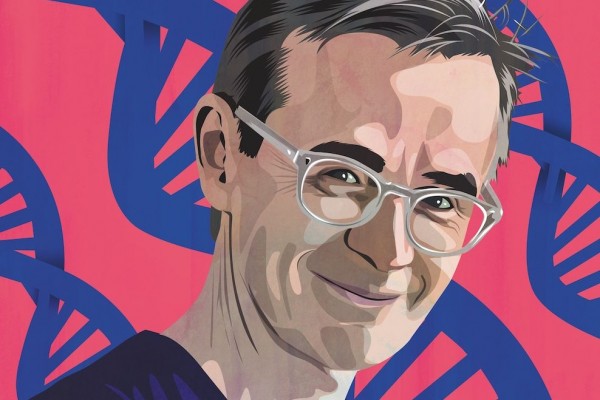Nigel Warburton: What is energy?
Caspar Henderson: Energy is eternal delight, according to William Blake! Or to take another view, as a living system we are obviously subject to the second law of thermodynamics, among other things. According to the biochemist Albert Szent-Györgyi, life is an electron looking for a place to rest. We need to have a flow of energy to sustain life, to sustain metabolism.
And that’s primarily in terms of water, food, making a shelter, and generating some heat – the basics we need for survival. But beyond that, we need energy for transport and any number of other things, everything we do. We need energy for all these things.
Yes, we start with food, obviously – plants and the animals that eat plants which we eat. Then humans managed to harness fire, which liberates energy through oxidation, and with industrialisation we get to a stage where we have huge resources of energy available to us. One way that people have described our current industrial economy that I think is quite interesting is we replaced slaves of classical antiquity with fossil fuels – coal, oil, and gas.
But what we hear about most today is the way we are squandering the natural resources laid down in the past. We’re both squandering them and producing huge amounts of pollution that obviously are damaging the ozone layer and resulting in warming. I wonder what the ethical issues or philosophical issues are around that for individuals?
It’s a really important question, but hard to give a good answer, at least for me. I think many of us have, for some decades, been aware of the challenges that climate change presents to us, potentially as a civilisation. At the same time, it’s perfectly possible to lead one’s life without engaging with these questions at all. If we have the resources, we can buy almost whatever goods we desire from all around the world. We can drive a fuel-hungry SUV, have a massively energy-inefficient house, or fly as many times as we want. There are people who act this way and don’t seem to be concerned at all about the consequences.
But if we do choose to pay attention, there are, I think, burning ethical questions to face in terms of what we believe is truly the nature of a good life, in terms of our own well-being and as social beings in a long continuum of time. What are our responsibilities to other people in parts of the world that are affected by climate change, perhaps now, but particularly in years to come, and to future generations? Because the science is very clear that there are likely to be really large-scale, adverse effects from the ways that societies as a whole, particularly the world’s most industrialised societies, consume energy. So, if we choose to pay attention to that, the ethical questions are of vital importance, and arguably are questions around which we can build our lives.
I recently heard the science fiction writer Kim Stanley Robinson put the point quite well. On the one hand, the future looks really bad for biodiversity, for life on Earth, for the flourishing of civilisation. That seems daunting, scary. On the other hand, young people don’t have to worry about life having meaning. There’s a super simple ethical question there. Do you choose to engage to try and mitigate damage and increase the possibility of flourishing in the future or not? And to an extent one can build one’s life around that.
That’s really interesting. I’ve never heard it put quite like that. The idea that the situation in relation to the disastrous impact of our uses of finite and polluting energy resources is one that can give meaning to your life. I’ve always felt that it was something that challenges the continuity of human existence long-term, and also one that polarises people between those who don’t care and those who do care, but possibly feel they can’t do very much about it.
Yes, maybe that is a helpful way to look at it: it’s easy to turn away. I think part of it is that we know there are many things we can do which will perhaps deliver direct benefits to ourselves and make us feel better, but overall make a tiny impact. Political scientists talk about collective action problems and wicked problems in massively complex systems. You know that you could make your house as green as possible and eat only plants from nearby and still you know that that’s an infinitesimal contribution. You know it may be right, and you may feel good for doing that, and you may feel that you’re a good example, but you know that there’s a huge disproportion between your individual actions and choices and the scale of the problem.
That disproportion is bewildering and troubling emotionally for us to deal with, and perhaps that can lead us to turn away from it and try not to think about it. Because once you start to think about all the things that need to change you might have to spend your evenings going to political meetings or knocking on people’s doors or something.
This issue about energy seems to be different from issues about animal suffering, for instance. So I might choose to eat a vegan diet or to diminish the amount of meat that I eat, knowing that will over a lifetime reduce the amount of suffering in the world. That doesn’t remove all suffering, but I know that, given current animal farming techniques and the methods of slaughter and so on, that it’s very likely that if I reduce or eliminate meat from my diet, my actions will have a measurable effect on the total amount of suffering, and that’s better than doing nothing. The trouble with the energy issue is that we have these tipping points, so that if we go beyond the tipping point it doesn’t really matter what I’ve done. We’re in that terrible situation, regardless of whether I’ve saved energy or not.
There is uncertainty in the climate science. There probably are tipping points, but we don’t know exactly where they are. It’s also the case that every fraction of a degree centigrade of average global temperature rise matters. The American journalist David Wallace-Wells put this well in his book The Uninhabitable Earth.
I would argue that there also need to be collective political decisions to invest in technologies to bring about a sufficiently rapid transition. So, for example, in the UK, we’re now in a position where we have more than half of our electricity supply coming from renewables such as wind and solar. And that’s among the largest proportions I think of any industrial economy. That sounds great, but we know that the next phases of transition, if we are to get to zero carbon, are going to be challenging. The upfront investment is significant – but it is by no means out of sight. The UK Committee on Climate Change, for instance, an independent advisory body to government, estimates in the region of one to two per cent of GDP, with huge benefits to society as a whole over time. But in Britain, as elsewhere, there are large political obstacles from vested interests that stand to profit from keeping things largely unchanged. We have to make these bigger-scale decisions as well.
You seem to be saying that if we’re judging as individuals how best we can contribute to the cause of getting to a saner use of energy, the best that we can do is try and bring about political change because that’s where large-scale transformations of energy, production, and use will occur.
That’s right. It’s hard to know how much time we have. Yet we actually do seem to be in a time of change. It’s quite striking in the last two, three, four years, even before COVID, and we’ll see what comes afterwards, there’s a growing sense that bigger change is possible. Things like the change of administration in the United States are very significant, and the Chinese declared commitment to reach net zero by 2060. At the time we’re speaking, a group of big private investors with $11 trillion in assets is pressuring the biggest global banks to stop financing carbon-intensive projects and to scale up their green lending. These kinds of things have been almost unthinkable, or very hard to imagine, actually taking place in the real world just a few years ago. But here we are. What actually transpires, and whether it’s sufficient, we have no way of knowing, but it does seem things have changed.
Is there shift in consciousness? It sounds like a hippy phrase from the 1960s, but it may be partly true. There is much greater awareness of the limits of systems within which we live, and the dangers involved in crossing certain thresholds. We have seen big changes in attitude and behaviour before. Think of changed behaviour in many countries over smoking. That seemed unthinkable in the 1950s, but things did change. Energy use is a bigger challenge, but nevertheless cultures do change. They do address big problems and it’s possible. That seems almost extraordinary to be saying that, but I believe it.
When I was growing up in the sixties and seventies, energy was not an issue that we ever learned about in primary school or secondary school really. We were more focused on possible nuclear annihilation. We didn’t really think about green energy or anything like that; whereas most students today at school will consider questions about energy in relation to pollution, global warming, and their impacts on the world. It seems to be in the general consciousness. At the same time, there’s still a huge cult of international air travel, which there wasn’t really when I was growing up. It’s interesting the way that has changed. So I agree on a global scale, there are these very promising signs, which are easy to forget, and that it’s easy to be pessimistic, but there are other cultural phenomena which seem to be working against any kind of solution to this looming problem. The reduction of prices of air tickets has meant that it’s very normal to go to America, Asia, or Australia for people in Britain, which it wasn’t when I was a child – it was absolutely exceptional for somebody to that.
Right. Yes. There’s a certain amount of compartmentalisation. We both, I imagine, know people who are very concerned about the environment, but who still might fly to, say, New York from time to time. I’ve done that myself. I’ve paid for an offset, but I know that offset is not really addressing the problem. There may be some hope in the case of air travel in a technological solution. People in the aviation industry talk about what they call sustainable aviation fuels, which can, at least in theory, be produced with net zero carbon. These fuels are expensive, and I think there are going to be obstacles to getting them rolled out at scale, and even then they won’t make flight truly climate ‘safe’, but they do have the potential to reduce its impact.
The change that matters isn’t always the change that individuals make. It’s building signals into systems and using the huge resources that wealthy and middle-income countries have to affect society-wide change so that becomes the default option.
There’s also the trade-off question, because there are lots of things you could do to reduce your use of energy, but the trade-off in terms of a satisfactory, worthwhile life in the world we live in. A lot of us enjoy the ability to go abroad. When you trade off too much of that, the diminished quality of life starts to become an issue. Do you want to lead a pure, good life and not be stimulated as an individual in the way that you might have been? Or do you want to try and find a balanced way to deal with the issues without over-consuming? We’ll always tell ourselves a story that we are not over-consumers ourselves, however much energy we use, because that’s the temptation of any kind of situation that benefits us. We’re all great rationalisers.
We’re in a culture sometimes labelled “the great acceleration” where we get more and more stimuli all the time that make our lives exciting and varied. But one could argue, without perhaps being too precious, that it’s perfectly possible to lead a good life without using huge amounts of energy. People clearly have done exactly this in the past, be it in classical China, or whatever culture you might think, their carbon footprint was trivial, but they led fully fulfilled lives because they had their poetry and they had their letters to friends, and they had their musical instruments, and their good food.
There’s scope for recalibration so that rather than going for the sugar rush of so much travel, we come to recognise the benefits of not travelling. I’m thinking of a friend of an acquaintance, who works in a company where they travel a huge amount. They had been flying all over the world all the time, but now they’re actually really enjoying the fact they don’t have to do that. I was speaking with someone else recently who would have travelled from the UK to Singapore, South Africa, and New York all within ten days, but who was instead able to hold all his meetings online. There are upsides to not having to do so much travelling. And if you could build up to that one really amazing trip to see the Great Barrier Reef before it’s all completely dead, but not all the other business trips, then that’s probably a very good thing.
But what about somebody who enjoys Formula 1 racing? Unless you redescribe the sport and make them use better fuel that produces less polluting by-products, and doesn’t encourage people to rev up their cars and drive really fast, there’s no way you can do that.
There probably isn’t. No. Even if you’re running on green fuel, there’s still going to be huge material use. That said, electric cars can have much better acceleration than ones running on internal combustion engines. All you need to do is stick on a sound system which can make really loud VROOM! noises, so you can press on the accelerator and make an incredible noise. That said, there probably will be people who just insist they love the smell and the smoke coming out of the back of their vehicle. I don’t know what to do about that.
Well, the question is whether you think you’re special or not. It’s like whether we’re equal. If your tendency is to be egalitarian to some extent, you might feel you shouldn’t be taking more than your share of resources, but you’re entitled to your share. If you’re very clearly using not only your resources, but lots of other people’s living resources too and making the world bad for the next generation as well, and you have no shame, it’s very difficult to do anything about it. But if you can push people towards recognising they’re in this world with other people, then there are some responsibilities that follow from that.
Yes. Some people seem to be quite unconcerned about being destructive and perhaps even enjoy annoying people who are concerned. But perhaps another way of changing things is thinking about ways in which people can assert status and position by doing good. Perhaps more of the super-wealthy – for as long as they’re not being heavily taxed – can do be encouraged to enhance their status by investing in ecological restoration and education rather than super yachts. It worked for Dale Carnegie with his libraries. They could invest in soil restoration and marine protection and have their name on that. Why not? That could be one way of bringing about change.
Caspar Henderson is an author and journalist who has written about energy and climate change for many years. He received the Roger Deakin Award from the Society of Authors in 2009 and the Royal Society of Literature Jerwood Award in 2010. He is the author of two acclaimed books: The Book of Barely Imagined Beings and A New Map of Wonders. At present he is writing A Book of Noises, a book about sound, and researching transition to zero carbon in the UK.





